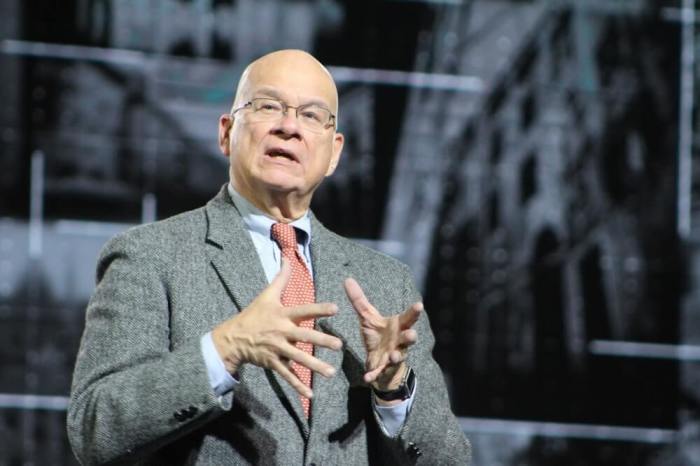Tim Keller: 5 Things Western Church Needs to Move Forward in Today's Culture

In Western societies, Christians are seen as too exclusive and narrow, and may soon be excluded from many public life positions, a situation that early Christians faced in Roman society. Today's Christians can learn from the experience of the latter, said theologian and Christian apologist Tim Keller, who listed five things the Church needs.
The early Christians had what Keller called an "effective missionary encounter" in Roman society. Though they were persecuted for being too exclusive and narrow, their numbers grew quickly, especially in the urban centers, said Keller, the founding pastor of Redeemer Presbyterian Church in New York City, on his church's blog.
This missionary encounter consisted of "both offense and attraction, confrontation and persuasion." The early Christians did not adapt to culture but they were not withdrawn from it either, Keller pointed out. They also critiqued culture (and suffered for it) yet their faith drew more and more people, resulting in converts daily.
As the Church grapples with today's culture, Christians must avoid either of the two extreme expectations, that "faithful witness will mean either fast, explosive growth (if we get the ministry formula just right) or a long-term dwindling with little fruit or impact," he noted.
The Church must also avoid "either assimilation or rigidity," added Keller, author of The Reason for God: Belief in an Age of Skepticism.
An effective "missionary encounter" might consist of five things, the theologian shared.
First, the Church needs a public apologetic that is both popular and "high."
We must not present a purely rational apologetic, but also a cultural one, just as Augustine did by developing a "High Theory" critique of pagan culture arguing thus: "Our beliefs and lives do not in any way weaken the social fabric — rather they strengthen them. Indeed, you will never have the society you want if you maintain your polytheism."
There must also be popular apologetics, Keller added. "We need to show how the main promises secular culture makes regarding meaning, satisfaction, freedom, and identity can't be fulfilled."
Second, the Church should be a counter-culture.
Keller explained that Christians should: be marked by a striking multi-ethnicity; be pioneers in civility, in building bridges to those who oppose us; be famous for our generosity, care for the poor and commitment to justice in society; and be committed to the sanctity of life, and to being a sexual counter-culture.
Third, Christians need to have a "faithful presence within the vocations."
"Today's church must equip Christians with the doctrine of vocation to integrate their faith with their work," Keller wrote. "This 'faithful presence' within the vocational fields by Christians would lead, among other things, to a reformation of capitalism (restoring trust to the financial markets through self-regulation), to a reformation of politics (restoring not just centrism but bi-partisanship), and to a reformation of the academy, the media, the arts, and technology."
Fourth, Christians need to have an evangelistic stance and approach.
"There is no evangelistic presentation that fits every culture," the theologian explained. "Every culture requires the basics of sin and salvation to be communicated in different ways. The gospel relates to other religions and world views as 'subversive fulfillment' — the Gospel fulfills culture's deepest aspirations, but only by contradicting the distorted and idolatrous means the world adopts to satisfy them."
Fifth, an effective missionary encounter consists of "Christian formation in a digital age."
"The early church formed people into vibrant Christians in the midst of a pagan culture," Keller said. The Church in today faces the same challenge, which is, in the midst of a secular culture with its narratives, how does the Church form Christians who are shaped more by the biblical story and narrative?
"In a digital era a person can take in thousands of words and hundreds of ideas every day that can undermine the power of what happens in face-to-face interaction. In this situation, how do we form people who are distinctly Christian?" he posed, suggesting Christians need new tools of catechesis, worship that combines ancient patterns of liturgy with cultural forms, and great use of the arts to tell the Christian story in stories, among others.




























